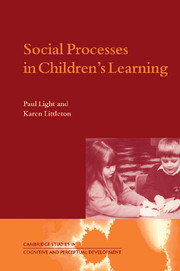Book contents
- Frontmatter
- Contents
- List of figures
- Preface
- Acknowledgements
- 1 Peer interaction and learning: perspectives and starting points
- 2 Peers and puzzles: a first series of studies
- 3 Computers and learning
- 4 Kings, Crowns and Honeybears: a second series of studies
- 5 Gender agendas
- 6 Social comparison and learning
- 7 Interaction and learning: rethinking the issues
- References
- Index
- Cambridge Studies in Cognitive and Perceptual Development
2 - Peers and puzzles: a first series of studies
Published online by Cambridge University Press: 22 September 2009
- Frontmatter
- Contents
- List of figures
- Preface
- Acknowledgements
- 1 Peer interaction and learning: perspectives and starting points
- 2 Peers and puzzles: a first series of studies
- 3 Computers and learning
- 4 Kings, Crowns and Honeybears: a second series of studies
- 5 Gender agendas
- 6 Social comparison and learning
- 7 Interaction and learning: rethinking the issues
- References
- Index
- Cambridge Studies in Cognitive and Perceptual Development
Summary
Introduction
Our own interest in conducting empirical research on peer interaction as a facilitator of children's problem solving was raised mainly by exposure to the neo-Piagetian research of Doise and colleagues, described in the previous chapter. However, the doubts raised earlier about the validity of Piagetian procedures for assessing conservation were also being raised by our own and others' research in relation to a wide range of other Piagetian tests. These included the spatial perspective taking tasks which had been so extensively used by Doise and colleagues in their peer interaction studies (Donaldson, 1978; Light and Nix, 1983).
Since our interest was the more general question of when, if at all, ‘two heads are better than one’, it seemed sensible to move beyond the particular case of children's mastery of ‘concrete operational reasoning’ to consider a wider range of ages and types of task. Nonetheless, as will be apparent from the account which follows, the basic three-stage experimental design which had been adopted by Doise and others was carried over fairly intact into these studies.
The first Tower of Hanoi study
The Tower of Hanoi is a traditional game which has not infrequently been used by cognitive psychologists to study problem solving. A typical version is shown in Figure 2.1. Here the materials consist of a baseboard with three vertical pegs, and a number of ‘tiles’.
- Type
- Chapter
- Information
- Social Processes in Children's Learning , pp. 14 - 26Publisher: Cambridge University PressPrint publication year: 2000



